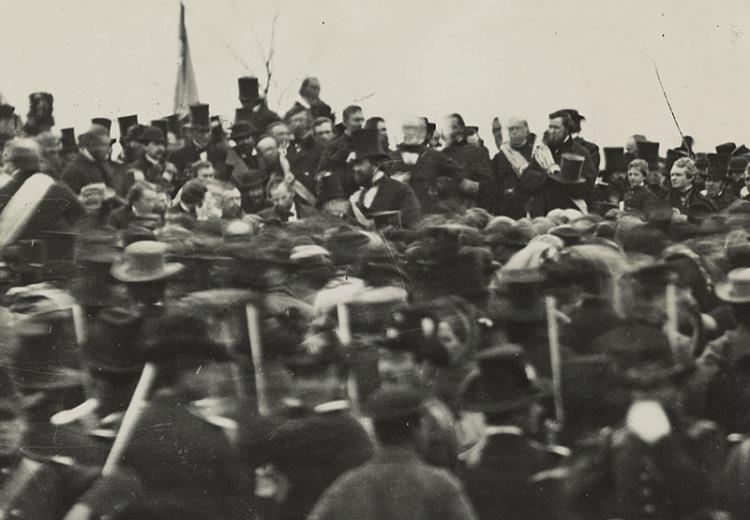Lesson 3: The Gettysburg Address (1863)—Defining the American Union

Photo of Lincoln at Gettysburg dedication. Lincoln is highlighted in this image in the middle of the crowd at the dais.
"It is the desire that, after the Oration, you, as Chief Executive of the Nation, formally set apart these grounds to their Sacred use by a few appropriate remarks." So read the invitation to Abraham Lincoln to speak at the dedication of a national cemetery on the site of a pivotal Union victory at Gettysburg, Pennsylvania. But contrary to popular belief, Lincoln did not give the keynote address. That oration was delivered by Edward Everett, a Massachusetts statesman, vice-presidential candidate of the Constitutional Union Party in 1860, and the most famous orator of his day. Everett spoke to the crowd of 15,000 without notes for over two hours. The president used only 272 words in his dedication of the cemetery grounds, with most American newspapers taking little notice of the now famous speech. But the day after the ceremony, Everett wrote Lincoln to say, "I should be glad, if I could flatter myself that I came as near the central idea of the occasion in two hours, as you did in two minutes."
This lesson will examine the most famous speech in American history to understand how Lincoln turned a perfunctory eulogy at a cemetery dedication into a concise and profound meditation on the meaning of the Civil War and American union.
This lesson will especially benefit teachers of AP U.S. History classes by deepening student understanding of the momentous themes of freedom, equality, and emancipation, listed in the Course Description as "Emancipation and the role of African Americans in the war," a subtopic under "Civil War." The learning activities will strengthen the higher order thinking skills students will need to do well on the AP exam, particularly the DBQ and essay part of the exam, by guiding them through an analysis of the themes that animate the Gettysburg Address, as they evaluate and judge Lincoln's enduring speech in light of an example of contemporary criticism that it drew.
Guiding Questions
How did Lincoln see the Civil War as an opportunity for the nation to bring forth a "new birth of freedom" (or liberty for all), and why was this necessary for the survival of American self-government?
Learning Objectives
Explain why some Northern Democrats criticized Lincoln's Gettysburg Address.
Explain why Lincoln thought July 4, 1776, was the birthday of the United States.
Articulate the connection Lincoln made between emancipation and preserving the Union.
Describe the "unfinished task" that Lincoln presented to the American people at Gettysburg.
